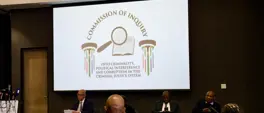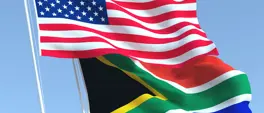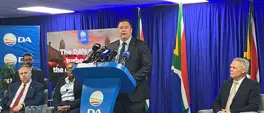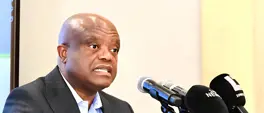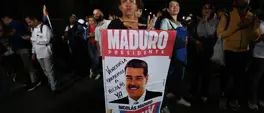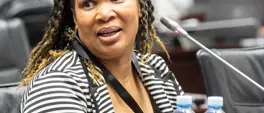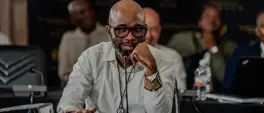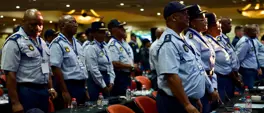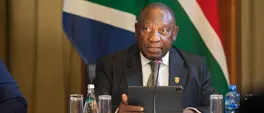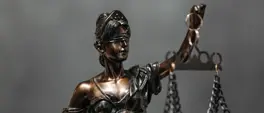YONELA DIKO: DA's secession bill - in search of a Volkstaat?
Yonela Diko
22 January 2024 | 7:00What the DA and its coalition of secessionists miss is that there is a purpose to the decentralisation of government - and it is not to create a quasi-federalist country split along ethnic and racial lines, writes Yonela Diko.
The Democratic Alliance (DA) in the Western Cape has been the main driver and anchor of the secessionist sentiments and recurring calls for the Western Cape to break away from the rest of the country among the right-wing organisations.
In October 2022, the DA lodged an intergovernmental dispute against the national government, calling for the devolution of police powers from the national to the provincial government because Minister Bheki Cele was not returning the Premier's calls.
While most criminal experts agree that there isn't one singular factor that can move something as macro as crime and more police and incarceration turn to have a limited impact in reducing crime without a multi-prong and comprehensive strategy, the DA is putting the Western Cape’s high crime rate on the singular factor of police numbers vis a vis the population, and puts no effort in any other of these multiple factors within their power to reduce crime.
The DA's intergovernmental dispute calling for the devolution of police powers brought new energy to the fringe right-wing civil group, the Cape Independence Advocacy Group (CIAG), which went on to claim that the devolution of police was, in fact, the first step in their collective strategy.
The advocacy group’s Phil Craig confirmed in his interview with Lester Kiewit that the devolution of police was their initial focus on their way to resolving legislative issues and calling for a referendum.
It turns out there is a DA-led group called a 'Devolution Working Group’, which is apparently a group of like-minded DA-led organisations who want out of the rest of the country through a Western Cape occupation.
In November last year, the DA lodged another intergovernmental dispute, this time against the National Treasury, disputing its allocation on the mid-term adjustment budget. The DA's crass and racist argument was that due to the in-migration (do I hear crossing of borders) of many citizens into the Western Cape, which they claim strains the provincial fiscus and resources, they need a bigger share.
It is such polarising and divisive rhetoric about other South Africans that has made the DA and the rest of the secessionists to find each other, and be seen by the rest to the proud and patriotic South Africans as enemies of the Unitary State.
SECESSIONISTS CONVERGE ON FEDERALISM
One of the members of this coalition of secessionists, Peter Marais of the Freedom Front Plus (FF+), who sponsored before the DA what they called the Western Cape People’s Bill, whose main objective was 'self-determination' of the people of Western Cape, particularly Afrikaans-speaking South Africans, remains obsessed with an independent Western Cape.
This bill seems to also be triggered by what they called 'successive waves of immigrants arriving' in the Western Cape. Marais thinks federalism is also another step towards self-determination, independence, and autonomy.
The DA has been clear that “in a country as diverse as ours, federalism makes sense. The DA is pursuing it to the fullest extent possible.”
DA FILES ITS OWN SECCESSIONIST BILL
The DA’s contribution to the secessionist coalition, after lodging disputes against the national government for blue-ticking them, has been to table a bill in July 2023 at the provincial legislature, saying it aims to help the party assert (read force) its existing constitutional powers and to try to get more powers delegated to it by the national government.
The DA is arguing that the national government is failing its governing role in the Western Cape, that the DA's provincial government can do a better job, and that the constitutional duties of the national government must be devolved to the province.
This is, of course, a political argument that has no legal standing. It is no different from the ANC claiming the DA is failing the poor in the Western Cape by running an exclusive enclave for the rich. It's an argument to be made to voters, who must then decide who to entrust their votes and livelihood with.
To then use political speech to make a constitutional argument is not only a vulgarisation of the Constitution but an attempt to break it.
If the DA wants more power, they must go make their case with the people.
A DECENTRALISED GOVERNMENT HAS ITS PURPOSE
What the DA and its coalition of secessionists miss is that there is a purpose to the decentralisation of government - and it is not to create a quasi-federalist country split along ethnic and racial lines.
The functional items listed on Schedule 5 of the Constitution, including the exclusive responsibility of the provincial government and includes provincial roads and traffic, ambulance services, and liquor licences are service needs that require a much closer sphere of government.
Even here, the national government can intervene when local spheres of government are struggling.
While decentralisation is supposed to promote democracy and legitimacy of government with more public participation, it has disadvantages, namely financial and capacity constraints.
There is also always a possibility of local governments being intimidated by powerful forces, and being forced to serve a few at the expense of many.
This is the recurring story of Cape Town and the Western Cape.
It is therefore worth repeating that if the DA wants more power, they must make their case with the people.
Yonela Diko is the former spokesperson for the Minister of Human Settlements, Water and Sanitation.
Get the whole picture 💡
Take a look at the topic timeline for all related articles.
